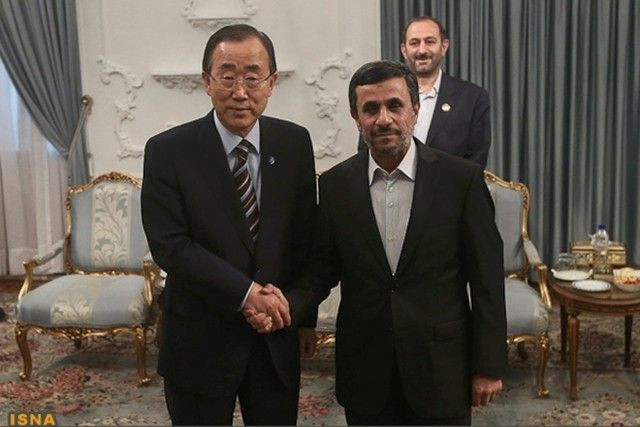NAM Summit Opens: UN Chief Slams Iran On Rights, Syria And Nukes

UN Secretary General Ban Ki-moon communicated to Iranian leaders his strong disapproval of Iran's rights record and its stand-on key issues causing regional and global tensions within hours of his arrival in Tehran to attend the Non-Aligned Movement (NAM) summit Wednesday.
In separate meetings with Iran's highest leader Ayatollah Sayyed Ali Hosseini Khamenei and President Mahmoud Ahmadinejad, Ban said "concrete" progress was needed to end Tehran's alleged nuclear weapons ambitions.
Ban called for "steps to address the concerns of the International Atomic Energy Agency and to prove to the world that its nuclear program is for peaceful purposes," UN Spokesperson, Martin Nesirky was quoted saying by al Jazeera.
The UN chief "regretted that little tangible progress has been achieved so far during those intensive talks" and added "that the talks needed to be serious and substantive," reports said.
Ban also told both Iranian leaders that their recent anti-Israeli comments were "offensive and inflammatory," Nesirky said.
"He also mentioned in his meeting with (Ahmadinejad) and separately with (Khamenei) that he strongly objected to recent remarks from Iranian officials denying the Holocaust and Israel's right to exist," Nesirky said.
Khamenei in February said Israel was a "cancerous tumor that should be cut and will be cut."
Speaking at a news conference with Iran's Parliament Speaker Ali Larijani, Ban said, "We have discussed how United Nations can work together with Iran to improve the human-rights situation in Iran. We have our serious concerns on the human-rights abuses and violations in this country."
Larijani is reported to have frowned when Ban rebuked Iran's rights record in his presence.
Iran, facing four rounds of U.N. Security Council sanctions for turning down calls to quit its alleged nuclear weapons program, sees the meeting of the 120-member-nation alliance, which doesn't formally align itself with or against any major power bloc, as the best diplomatic opportunity to confront the Western powers.
Discussing the ongoing Syrian bloodshed, Ban urged the Iranian leaders "to use Iran's influence to impress upon the Syrian leadership the urgent need for the violence to stop and to create the conditions for genuine dialogue."
Iran continues to support Syrian President Bashar al Assad and has been accused of breaching UN sanctions by supplying arms to Assad's forces.
Ban "called on all states to stop supplying arms to all sides in Syria," his spokesman said.
Iranian lawmaker Alaeddin Boroujerdi said the government was planning to propose the formation of a nonaligned team that will include Egypt, Iran and Venezuela, plus the two neighbors of Syria, Iraq and Lebanon, to help resolve the crisis there, Iran's state media reported.
The UN chief condemned "recent rhetoric we have heard from all kinds of quarters" about the possibility of a preemptive Israeli strike on Iranian nuclear facilities.
Ban had decided to attend the NAM summit amid calls from Western political establishment and media for boycott due to Iran's stance on Syrian crisis and the standoffish atmosphere with Israel compounded with its stubborn attitude regarding nuclear weapons.
"Mr. Ban will be forced to endure public lectures from the Iranian leaders about their right to enrich uranium and rants threatening to wipe Israel off the map," the Washington Post said in an editorial published Aug. 15.
Israeli newspaper Haaretz had echoed the Post saying, "by shaking Ahmadinejad's hand, Ban will be crossing a red line by legitimizing the Iranian president's recent anti-Israel and anti-Semitic tirade."
Ahmadinejad was quoted saying in a Ramadan speech that "anyone who loves freedom and justice must strive for the annihilation of the Zionist regime in order to pave the way for world justice and freedom," the report said.
Iran's opposition groups had urged the UN chief to use his appearance in Tehran to criticize Iranian government over its crackdowns on political dissent.
© Copyright IBTimes 2024. All rights reserved.






















